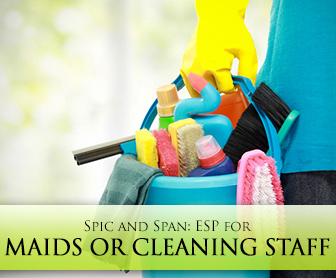May I Take Your Order? : ESP for Food and Beverage Staff


Firstly you will be focusing only on English that is pertinent to the field of the students and so your lessons will be more targeted, and secondly, you will have to put a lot of emphasis on words and phrases related to the field your students wish to learn about. Today will talk about how to teach English for maids or cleaning staff in homes.
Housekeeping is a broad term used to refer to people who do domestic work, especially cleaning and upkeep of the home or hotel in which they work. Your students in this field will either be looking for a job or will already have a job in the housekeeping department of a hotel or in someone’s private residence. It is important to differentiate the workers in hotels from personal homes because though the job is essentially the same, there are some differences in the work and in the English phrases they will use. For the purpose of this article we will focus mainly on housekeepers who work in private homes. As with most lessons in ESP, roleplaying and vocabulary and phrase lists will be your best teaching tools.
If your students have not yet found a job as a housekeeper, it is important that they understand the terminology that they may see in advertisements in the newspapers. It is important that you as a teacher come up with several mock ads and use some of the following phrases in them in order to get your students familiar with the terminology.

The employer wants someone who will clean everything rather than “sweeping the dust under the rug” and skipping over things.
The employer wants someone who can work whenever he or she is needed rather than having a set schedule.
(a) Lives in the house where he or she works.
(b) Housekeeper lives in their own home and travels to work.
Instead of being paid, the housekeeper would work in someone’s home and be provided with a room and meals (sometimes a small amount of pay will be included).
The employer wants the housekeeper to tell them where they have worked before and to be able to call the previous employer to verify whether or not he or she is a good worker.
This is a sample list of words that you should include in your mock ads to teach your students what to be on the lookout for. In the mock ad exercise, you could come up with 5 - 10 different ads and then come up with the same amount of descriptions of housekeepers which you can match to the ads. Have the students read them and try to match the housekeeper to the job that is right for them. This will encourage them to read and to improve their logic and cognitive skills in English.
One of the hardest things for housekeepers with a limited vocabulary in English to do may be understanding their employer’s instructions. They always have the option to ask the employer to speak more slowly if they cannot understand, however this may not seem professional in some cases and so the solution for this would be to have your students come up with a checklist of chores or duties they may need to perform in the house. The checklist would include things like sweeping, mopping, laundry and any other duties they need to perform. A great exercise would be to draw a table with three columns as illustrated below with duties, a check box, and an empty column for details if needed. Have the students come up with the duties they may need to perform and then have them define the terms. You can then pretend to be the employer and write in the specifications for the task and teach them what they mean.
| DUTY | YES / NO | SPECIFICATIONS |
| Sweep | YES | Kitchen, Living Room, Bedrooms |
| Laundry | NO | |
| Bathrooms | YES | Master Bedroom, Mudroom |
It is important to have roleplaying exercises as well to ensure that they become more comfortable with speaking English and can understand the different things their employers may ask or say. For these types of exercises, you can either have your students interact with each other or you can pretend to be the employer and have one student respond at a time. Some of the key phrases that they may need are listed below.
If they are unclear about something
If they understand something
There are not very many resources online which talk about teaching English for maids, however after quite a bit of Googling, I found one page which has an extensive and very comprehensive list of words and terms that will be useful for your housekeeping students to learn and use on a daily basis. The site divides the list of vocabulary into seven different categories which include the rooms of the house, furniture and décor which may be found in the house, all the major appliances that can be found in the home, cleaning supplies, laundry and linen terms, descriptive words that employers and housekeepers may find themselves using in conversation, as well as action words that they may come across. The site is - http://www.englishclub.com/english-for-work/housekeeping-vocabulary.html